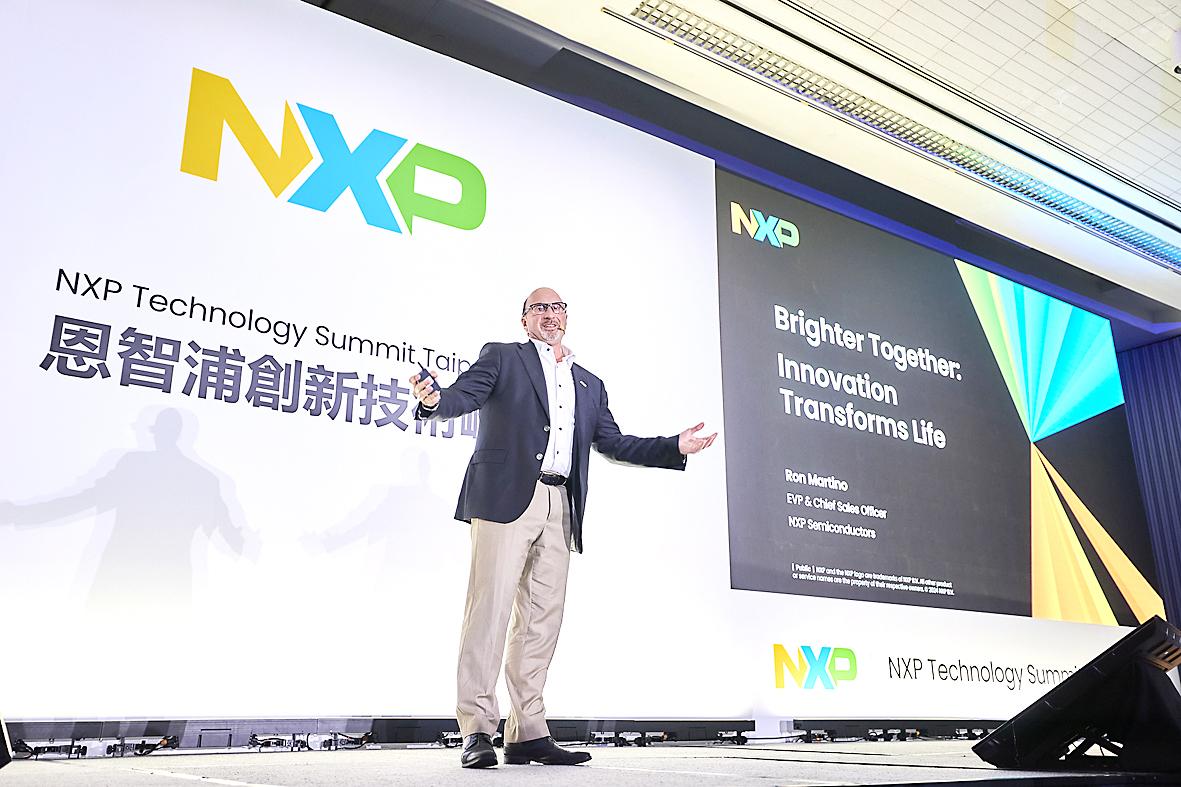The automotive and industrial Internet of Things are two major growth drivers for NXP Semiconductors NV in the next three years, despite the US’ tightening curbs on semiconductor exports to China, the world’s second-largest car chip supplier said yesterday.
The company expects the two segments to see business grow at between 8 and 12 percent from next year to 2027, NXP executive vice president and chief sales officer Ron Martino said at a media briefing in Taipei.
Martino attributed the growth mainly to an increase in semiconductor contents in cars, though the electric vehicle (EV) market is slowing and uncertainty about the world economy abounds, he said.

Photo on courtesy of NXP Semiconductors NV
Asked about what the US’ latest semiconductor export restrictions to China imply for the Dutch company, Martino said that NXP provides services in many countries and regions around the world, and it works to comply with all regulatory requirements placed on the company.
“We have been managing this for many years, very effectively, and we will continue to manage it as different regulatory requirements are applied to NXP,” Martino said.
“We continue to see a very healthy business. We continue to see that we work well together across all regions, with all parties,” he added.
China was the biggest market for NXP last year, representing 33 percent of the company’s total revenue.
The Asia-Pacific market, excluding China, came second with a 28 percent share.
In Taiwan, NXP has formed strong partnerships with Hon Hai Precision Industry Co (鴻海精密) and Foxtron Vehicles Technologies Co (鴻華先進) to introduce at least four EV models in a very short period of time, Martino said.
That is because NXP can bring its new technologies to the market faster in about one to two years, compared with a longer cycle of three to five years, he said.
Aside from Taiwan, such short development cycles only occur in some innovative and disruptive companies in the US or China, he said.
In related news, Hon Hai yesterday reported revenue last month grew 3.47 percent from a year earlier to NT$672.59 billion (US$20.73 billion), benefiting from strong demand for artificial intelligence servers and related components as well as new notebook computers.
“The second half of the year is traditionally the peak season for the information and communication technology industry, so operations are expected to gradually gain momentum quarter by quarter,” Hon Hai said in a statement.
Revenue this quarter is expected to “show significant growth on both a quarterly and yearly basis,” it said.
In the first 11 months, the company accumulated NT$6.21 trillion in revenue, an increase of 8.87 percent from NT$5.7 trillion in the same period last year, Hon Hai said.
Hon Hai, a major assembler of iPhones and AI servers powered by Nvidia Corp's chips, expected revenue this year to grow "significantly" from last year to reach an all-time high.

UNCERTAINTY: Innolux activated a stringent supply chain management mechanism, as it did during the COVID-19 pandemic, to ensure optimal inventory levels for customers Flat-panel display makers AUO Corp (友達) and Innolux Corp (群創) yesterday said that about 12 to 20 percent of their display business is at risk of potential US tariffs and that they would relocate production or shipment destinations to mitigate the levies’ effects. US tariffs would have a direct impact of US$200 million on AUO’s revenue, company chairman Paul Peng (彭雙浪) told reporters on the sidelines of the Touch Taiwan trade show in Taipei yesterday. That would make up about 12 percent of the company’s overall revenue. To cope with the tariff uncertainty, AUO plans to allocate its production to manufacturing facilities in

TAKING STOCK: A Taiwanese cookware firm in Vietnam urged customers to assess inventory or place orders early so shipments can reach the US while tariffs are paused Taiwanese businesses in Vietnam are exploring alternatives after the White House imposed a 46 percent import duty on Vietnamese goods, following US President Donald Trump’s announcement of “reciprocal” tariffs on the US’ trading partners. Lo Shih-liang (羅世良), chairman of Brico Industry Co (裕茂工業), a Taiwanese company that manufactures cast iron cookware and stove components in Vietnam, said that more than 40 percent of his business was tied to the US market, describing the constant US policy shifts as an emotional roller coaster. “I work during the day and stay up all night watching the news. I’ve been following US news until 3am

COLLABORATION: Given Taiwan’s key position in global supply chains, the US firm is discussing strategies with local partners and clients to deal with global uncertainties Advanced Micro Devices Inc (AMD) yesterday said it is meeting with local ecosystem partners, including Taiwan Semiconductor Manufacturing Co (TSMC, 台積電), to discuss strategies, including long-term manufacturing, to navigate uncertainties such as US tariffs, as Taiwan occupies an important position in global supply chains. AMD chief executive officer Lisa Su (蘇姿丰) told reporters that Taiwan is an important part of the chip designer’s ecosystem and she is discussing with partners and customers in Taiwan to forge strong collaborations on different areas during this critical period. AMD has just become the first artificial-intelligence (AI) server chip customer of TSMC to utilize its advanced

Six years ago, LVMH’s billionaire CEO Bernard Arnault and US President Donald Trump cut the blue ribbon on a factory in rural Texas that would make designer handbags for Louis Vuitton, one of the world’s best-known luxury brands. However, since the high-profile opening, the factory has faced a host of problems limiting production, 11 former Louis Vuitton employees said. The site has consistently ranked among the worst-performing for Louis Vuitton globally, “significantly” underperforming other facilities, said three former Louis Vuitton workers and a senior industry source, who cited internal rankings shared with staff. The plant’s problems — which have not